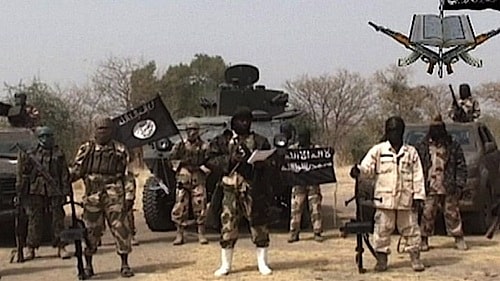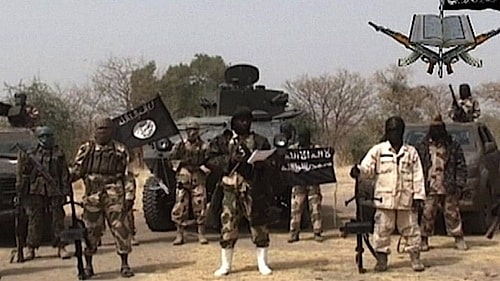
What to do when an intervention has completely imploded, contributing to 200,000 deaths, destroying a country, and pushing the US closer to a nuclear conflict with Russia than at any time in the past 40 years?
Well if you are President Obama you press forward with yet another US military intervention!
And of course you ignore the Constitution in the process.
President Obama announced yesterday that he would be sending some 300 US troops to the African country of Cameroon to help battle Boko Haram, a fundamentalist Sunni sect influenced by Wahhabism — Saudi Arabia’s second most famous export. Earlier this year, the leader of Boko Haram allegedly pledged his group’s allegiance to ISIS.
So the US is going into yet another Muslim country to fight ISIS. Because the battle has been going so well in Iraq and Syria?
But it’s worse than that: the Boko Haram problem is a direct result of the chaos created by the 2011 US attack on Libya. As the Guardian’s Seumas Milne put it last year:
But it’s not just Libya that’s living with the fallout from Nato’s intervention. Blowback from the Libyan war has spread across Africa, destabilising the Sahel region and beyond. After Gaddafi’s fall, Tuareg people who had fought for him went home to Mali, bringing Libyan arms caches with them. Within months, that had tipped northern Mali into full-scale armed rebellion and takeover by Islamist fighters.
The result was last year’s French military intervention, backed by the US and Britain. But Libya’s impact goes much wider. Among the groups whose armed campaigns have been fuelled by large-scale heavy weapons supplies from Gaddafi’s looted arsenals is Boko Haram.
Yes, the seemingly sudden increase in power of the Boko Haram group was thanks to the US attack on Libya, which spread Gaddafi’s entire military arsenal to the four winds and back.
Obama also indicated that he would be sending in US drones to gather intelligence and perform reconnaissance operations against Boko Haram. Those who do not believe the US Predator drones will not soon be firing missiles into Cameroon — perhaps using the “signature strike” methodology — are simply not paying attention.
Obama got around to informing Congress of his decision after some 90 troops had already been sent.
Obama did have permission from the government of Cameroon to send in the US military — unlike in Syria — but he did not bother to ask his own government for permission. Congress has sunk so low that probably a text message or a Tweet from the White House would be considered an acceptable replacement for a war declaration request.
We have been subjected to a steady stream of stories about the horrors of Boko Haram — no doubt true — and in particular their seeming preference for kidnapping young girls. That makes it a particularly exciting US military action for the “humanitarian interventionists” in the White House. We’ve all seen the First Lady Michelle Obama holding up her sign demanding that Boko Haram “bring back our girls” — strange because they were actually Nigerian girls. Also strange because there was never that much real evidence about who the girls were, where they came from, whether they had actually been kidnapped. The stories provoked an emotional response but were never that well reported. Perhaps by design.
So while the “humanitarian” interventionists hope to score some points on this US military action in yet another country, it remains to be seen just how effective 300 US troops will be once thrust into a very complex situation half a world away. Will they fully understand the situation on the ground? It is unlikely.
This intervention, like Obama’s other interventions, is bound to fail. It is a new US intervention to fix the problems caused by the last US intervention in the region. People will start dying in Cameroon from US weapons. Another war has begun.


